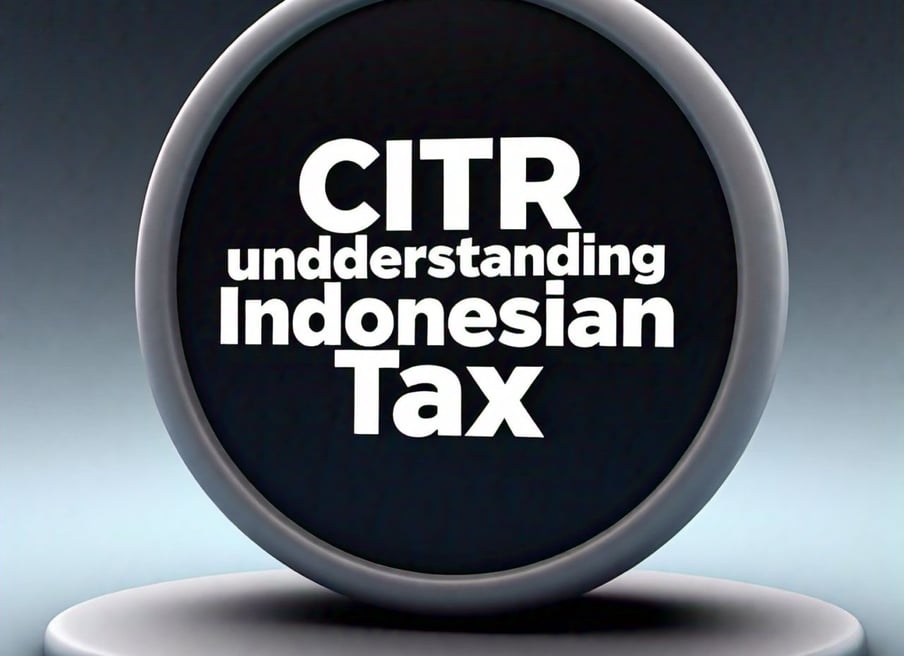Understanding Corporate Income Tax Rate in Indonesia
Corporate Income Tax Rate (CITR) in Indonesia is currently set at 22%, significantly impacting a company's taxable income and overall profitability. Learn more about CITR and its implications for businesses.
GUIDE TO GROWTH BUSINESS IN INDONESIATAX IN INDONESIA
Ayu Setia Natalya
12/24/20243 min read


In today's competitive business environment, effective financial management is crucial for success. One key aspect of this is optimizing your Corporate Income Tax Rate (CITR). While paying taxes is a legal obligation, strategic tax planning can help businesses minimize their tax liabilities legally and maximize profitability. This blog post will explore how effective tax planning can help you optimize your CITR.
Understanding CITR
CITR refers to the percentage of tax levied on a company's taxable income. It's a significant factor affecting a company's bottom line. In Indonesia, the current CITR is 22% (based on the HPP Law). However, the effective CITR—the actual percentage of income a company pays in taxes—can be lower through strategic tax planning.
The Importance of Effective Tax Planning
Effective tax planning goes beyond simply filing tax returns. It involves proactive strategies to minimize tax liabilities within the bounds of the law. Here's why it's crucial:
Increased Profitability: By reducing tax expenses, businesses can retain more profit, which can be reinvested for growth or distributed to shareholders.
Improved Cash Flow: Lower tax payments improve cash flow, providing greater financial flexibility for operations and investments.
Enhanced Competitiveness: Lower tax burdens can give businesses a competitive edge by freeing up resources for innovation and expansion.
Compliance and Risk Mitigation: Effective tax planning ensures compliance with tax regulations, minimizing the risk of penalties and legal issues.
Strategies for Optimizing CITR through Tax Planning
Several strategies can be employed to optimize CITR:
Maximizing Allowable Deductions: Businesses can reduce their taxable income by claiming all eligible deductions, such as business expenses, depreciation, and amortization. Maintaining accurate records is crucial for this.
Utilizing Tax Incentives: The Indonesian government offers various tax incentives for specific industries or investment activities, such as tax holidays, tax allowances, and investment allowances. Businesses should explore available incentives that apply to their operations.
Strategic Timing of Income and Expenses: By strategically managing the timing of income recognition and expense incurrence, businesses can optimize their tax liability in a given tax year.
Transfer Pricing Optimization (For Multinational Companies): For multinational companies, strategically structuring intercompany transactions can optimize their global tax burden while adhering to transfer pricing regulations.
Proper Tax Structuring: Choosing the right business structure (e.g., PT, CV) can have significant tax implications. Consulting with a tax advisor can help determine the most tax-efficient structure.
Utilizing Tax Credits: Tax credits directly reduce the amount of tax owed, providing a more significant benefit than deductions. Businesses should identify and utilize applicable tax credits.
The Role of a Tax Consultant
Navigating the complexities of tax laws and regulations can be challenging. A qualified tax consultant can provide invaluable assistance in developing and implementing an effective tax plan. They can:
Identify relevant tax incentives and deductions.
Ensure compliance with tax regulations.
Develop customized tax strategies tailored to your specific business needs.
Represent your business in tax audits or disputes.
Specific Example in Indonesia:
In Indonesia, for instance, utilizing the available tax incentives for certain industries or regions can significantly reduce the effective CITR. Also, properly managing deductible expenses, such as employee benefits and operational costs, is crucial for minimizing taxable income.
Effective tax planning is essential for optimizing CITR and maximizing profitability.
Several strategies can be employed to reduce tax liabilities legally.
Consulting with a tax professional is highly recommended to ensure compliance and maximize tax benefits.
Ready to Optimize Your CITR and Enhance Your Business's Financial Performance?
At Dana Consultants, we specialize in providing comprehensive tax planning services tailored to businesses of all sizes. Our experienced team can help you:
Identify applicable tax incentives and deductions.
Develop a customized tax strategy aligned with your business goals.
Ensure compliance with Indonesian tax regulations.
Contact us today for a consultation:
Email: askcfo@dana-consultants.com
Phone: +62 8112742314
Don't leave your tax optimization to chance. Let Dana Consultants help you unlock your business's full financial potential.
Disclaimer: This blog post provides general information about tax planning and CITR and can be changed anytime
Contact
askcfo@dana-consultants.com
Connect with us
Subscribe to our newsletter
+62 811 2742 314
© 2024 - DCI Ayu Setia Natalya - PT. Dana Consultants Indonesia . All Right Reserved
